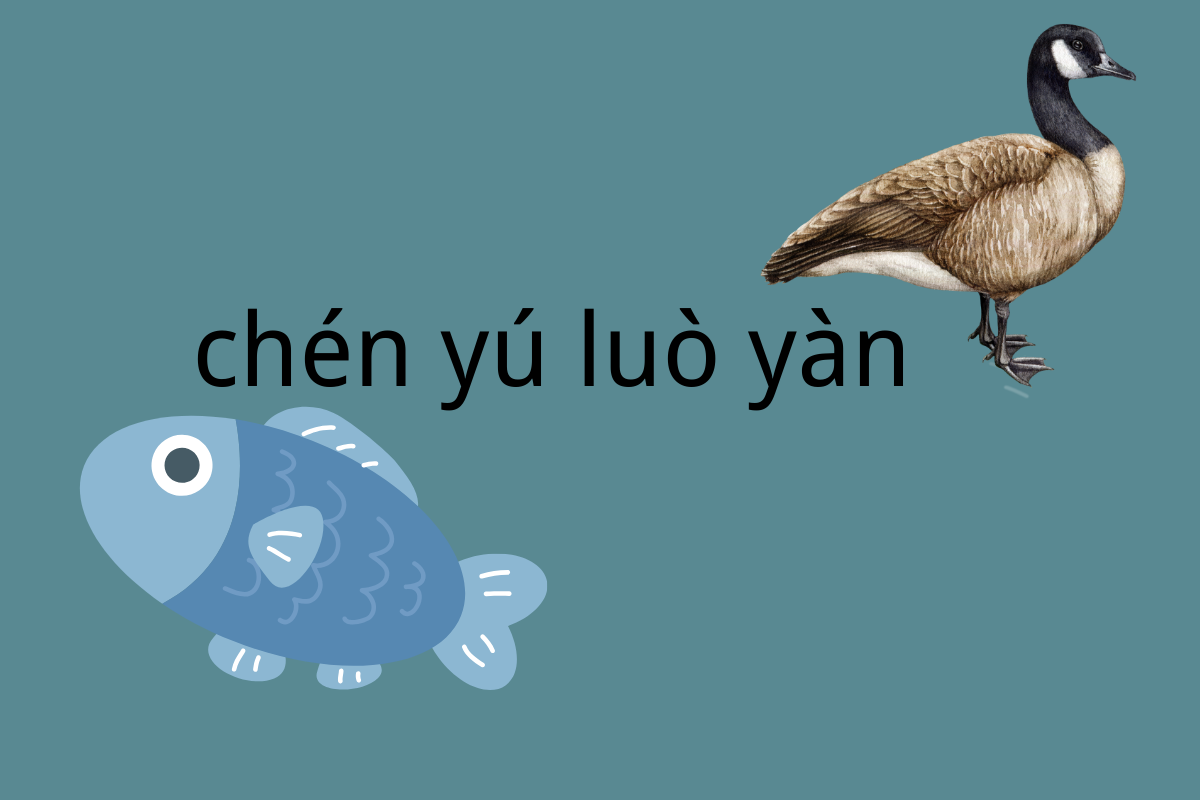Enchanting Beauty: A Tale of Alluring Charm
In the rich tapestry of Chinese culture, the phrase "沉鱼落雁" (chén yú luò yàn) holds a special place, embodying the concept of breathtaking beauty. This elegant expression, often used in poetry and literature, refers to the astonishing 吸引力 (xīyǐn lì) attractiveness of a person, particularly a woman, that can captivate anyone who beholds her. Let's explore the story behind this phrase,understand its meaning, and learn how it can be incorporated into daily Chinese.

吸引力(xīyǐn lì): noun. attractiveness
Example:
He is a very attractive man.
他是个非常有吸引力的人。
tāshìɡèfēi chánɡyǒu xīyǐn lìde rén
It doesn't really appeal to me.
它对我真的没有什么吸引力。
tāduìwǒzhēn de méi yǒu shén me xīyǐn lì
The Story
The phrase "沉鱼落雁" (chén yú luò yàn) has its roots in ancient Chinese literature, specifically in the epic novel "The Biography of the White-Haired Maiden"《白发魔女传, bái fà mó nǚ zhuàn) written by Liang Yusheng during the 1950s. The story revolves around the character Zhao Linger, a woman of incomparable beauty. Her striking looks were so 迷人的 (mí rén de) captivating that they had the power to stop fish from swimming and birds from flying. People who encountered her were utterly entranced by her allure.
"沉鱼落雁" (chén yú luò yàn) is a Chinese idiom, which is usually used to describe the extremely beautiful and charming characteristics of women. This idiom comes from ancient Chinese legends and literary works, one of the most famous stories being about Xi Shi. Xi Shi was a beautiful woman in the Spring and Autumn Period of China. She was known as one of the four beauties in ancient China. According to legend, Xi Shi's beauty is as beautiful as a fish sinking into the water or a fairy geese landing in the sky. Her beauty fascinated Gou Jian, the king of Yue, and she became the queen of Yue. Due to the beauty of Xi Tzu, the State of Yue received various kinds of help and finally successfully recovered.
In addition to Xi Shi, there were many other beauties in ancient China, such as Wang Zhaojun, Diao Chan, Yang Guifei, etc. They were often described as "the fish sinks and the wild goose falls, and the moon shys the flower" to emphasize their beauty and stunning charm.
迷人的(mírén de):Adj. captivating
Example:
He was gifted with a charming smile.
他有一副迷人的微笑。
tāyǒu yífùmírén de wēi xiào。
Madagascar is the most fascinating place I have ever been to.
马达加斯加是我去过的最迷人的地方。
mǎdájiāsījiāshìwǒqùɡuòde zuìmírén de dìfɑnɡ.
The Meaning
"沉鱼落雁" (chén yú luò yàn) literally translates to"fish sinking and geese landing." Figuratively, it describes a person's extraordinary beauty that is so enchanting it can leave others utterly mesmerized, just like the way fish might stop swimming or birds might cease their flight to gaze upon such beauty. It conveys the idea of being exceptionally attractive and alluring.
"沉鱼落雁" (chén yú luò yàn) is a beautiful and evocative phrase that can be used in daily conversation to describe someone or something of extraordinary beauty. Here are some everyday scenarios in which you can use this phrase:
Complimenting Someone's Appearance:
Your outfit today is truly 沉鱼落雁(chén yú luò yàn), absolutely gorgeous.
你今天的打扮真是沉鱼落雁(chén yúluòyàn),简直美极了。
nǐ jīn tiān de dǎ bàn zhēn shì chén yú luò yàn,jiǎn zhí měi jí le。
Describing Natural Scenery:
The place with its picturesque lakes and mountains feels like 沉鱼落雁(chén yú luò yàn).
那个湖光山色的地方让人感觉如同沉鱼落雁(chén yú luò yàn)。
nà ɡè hú ɡuānɡ shān sè de dì fɑnɡ rànɡ rén ɡǎn jué rú tónɡ chén yú luò yàn。
Praising Art or Performances:
The artist's work is truly 沉鱼落雁(chén yú luò yàn), filled with the charm of art.
这位画家的作品真的是沉鱼落雁(chén yú luò yàn),充满了艺术的魅力。
zhè wèi huà jiā de zuò pǐn zhēn de shì chén yú luò yàn, chōnɡ mǎn le yì shù de mèi lì。
Key Sentences:
She entered the room,and her beauty was chén yú luò yàn.
她走进房间,她的美丽令人沉鱼落雁。
Tāzǒu jìn fángjiān,tāde měilìlìng rén chén yúluòyàn.
The sunset over the ocean was chén yú luò yàn.
大海上的日落沉鱼落雁。
Dàhǎi shàng de rìluòchén yúluòyàn.
The flowers in the garden are so beautiful that they're chén yú luò yàn.
花园里的花朵如此美丽,宛如沉鱼落雁。
Huāyuán lǐde huāduǒrúcǐměilì,wǎn rúchén yúluòyàn